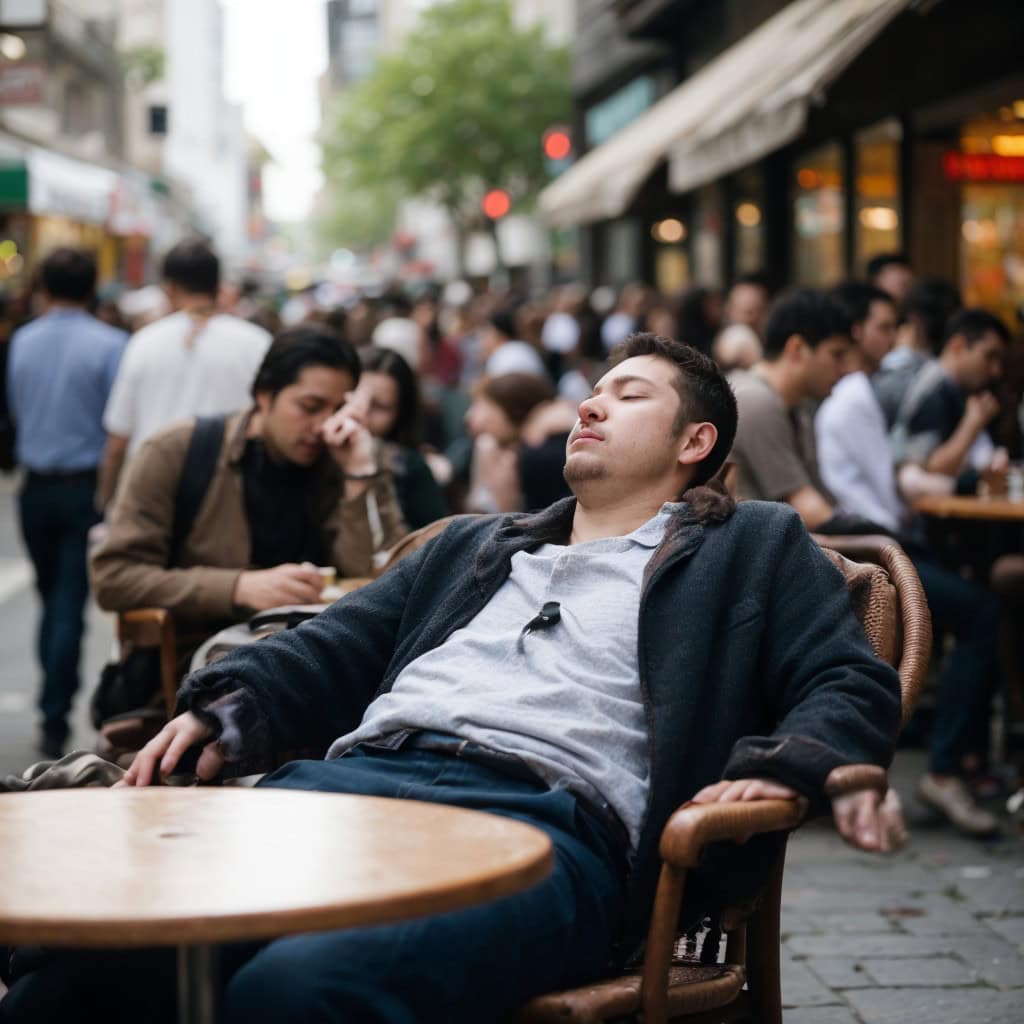Picture this: waking up every morning feeling refreshed, energized, and ready for the day. Sounds amazing, right? But for many, it feels impossible. Good sleep isn’t just a luxury; it’s a necessity for our health. Despite how important it is, lots of people don’t get enough sleep. This article will explore why sleep is so crucial, why some people don’t get enough, and practical ways to improve your sleep.
Why sleep is important

Sleep is essential for our overall health. The National Sleep Foundation says sleep affects almost every part of our body, including the brain, heart, lungs, metabolism, skin health, and immune system.
Consistently getting a good night’s sleep gives you many benefits.
- Better Mood: When you sleep well, you’re more likely to wake up in a good mood. You’ll feel happier and less stressed.
- Improved Memory and Learning: Good sleep helps your brain process and remember information. You’ll find it easier to learn new things and remember what you’ve studied.
- More Energy: Sleep gives your body a chance to rest and recharge. You’ll have more energy to do the things you enjoy and to stay active throughout the day.
- Stronger Immune System: Consistent sleep helps your body fight off illnesses. You’ll be less likely to get sick because your immune system will be stronger.
- Healthier Skin: Good sleep allows your skin to repair and renew itself. You’ll have a clearer complexion, and your skin will look more radiant and healthy.
- Better Focus and Concentration: When you’re well-rested, it’s easier to pay attention and focus on tasks. This can help you do better in school and other activities.
- Growth and Development: Sleep is important for growth, especially for teens. It helps your body grow and develop properly.
- Weight Management: Getting enough sleep helps regulate the hormones that control hunger. You’ll be less likely to overeat and more likely to maintain a healthy weight.
- Physical Health: Good sleep supports heart health and reduces the risk of developing problems like high blood pressure and diabetes.
By consistently getting a good night’s sleep, you’ll feel better physically, mentally, and emotionally. You’ll be more prepared to take on challenges and enjoy life to the fullest.
Wait, did you say “Healthier skin?”
Yes, I did. Our lives benefit in many ways from getting good sleep, but one that I’m a bit obsessed with right now is how it helps our skin look better, and helps us with “graceful aging.”

Good sleep has several beneficial effects on our skin’s health and appearance:
- Cell Repair and Growth: When you sleep, your body works on repairing and growing new skin cells. This helps fix any damage from things like sunburn or pollution, making your skin healthier.
- Collagen Production: Sleep helps your body make collagen, a protein that keeps your skin firm and elastic. More collagen means fewer wrinkles and smoother skin.
- Better Blood Flow: Good sleep improves blood flow to your skin. This brings more oxygen and nutrients, making your skin look healthier and more vibrant.
- Less Inflammation: Not getting enough sleep can cause inflammation, leading to skin problems like acne or eczema. Enough sleep helps reduce inflammation, keeping your skin clear and calm.
- Hydration: Sleep helps keep your skin hydrated. When you don’t sleep well, your skin can become dry and dull. Proper sleep helps your skin hold onto moisture, giving it a fresh look.
- Stress Hormone Control: Sleep helps control cortisol, a hormone that increases when you’re stressed. High cortisol levels can lead to oily skin and acne. Good sleep keeps cortisol in check, reducing these issues.
- No Dark Circles or Puffiness: Getting enough sleep prevents dark circles and puffiness under your eyes. Lack of sleep can cause blood vessels to expand and fluid to build up, leading to these problems.
- Strong Skin Barrier: During sleep, your skin’s protective barrier gets stronger. This barrier keeps harmful things out and locks moisture in, keeping your skin healthy and hydrated.
By getting enough good-quality sleep, you help your skin repair, stay hydrated, produce collagen, and reduce inflammation, making it look and feel healthier. That helps you age gracefully, looking and feeling beautiful.
What quality sleep looks like

During a good night’s sleep, your body and brain go through several important stages to help you feel refreshed and healthy.
- Falling Asleep: First, you start to relax and drift off to sleep. Your breathing slows down, and your muscles relax.
- Light Sleep: In the next stage, you enter light sleep. Your body starts to repair itself, and your brain processes information from the day. You can still wake up easily in this stage.
- Deep Sleep: Then you move into deep sleep. This is when your body does most of its repair work. Your muscles, tissues, and cells get fixed and grow. Deep sleep also boosts your immune system, which helps you fight off illnesses.
- REM Sleep: Finally, you enter REM sleep, which stands for Rapid Eye Movement. During REM sleep, your brain is very active, and this is when you dream. This stage helps with memory and learning. Your brain organizes and stores the things you learned during the day.
These stages repeat several times during the night. Getting enough of each stage is important because:
- Deep sleep repairs your body.
- REM sleep helps your brain stay sharp.
When you get a good night’s sleep, you wake up feeling rested, your body is ready to take on the day, and your brain can think clearly and remember things better. Plus, good sleep can help you have healthier skin, a stronger immune system, and a better mood.
Why people don’t get enough sleep

Not getting enough sleep can impact your mood and emotional well-being. It can lead to irritability, stress, anxiety, and depression. Over time, this emotional instability can strain relationships and reduce overall quality of life.
Many factors can keep people from getting enough sleep. For me, there’s always “one more thing to do” before I want to go to bed. After a long day of working and socializing and cleaning up house, it’s often 11:00 PM, which is Girl Friday’s “official” bedtime. But I want to read some in a book, I want to play a video game, and maybe I want to stay up talking with a friend. I feel like I deserve those things.
Surely I do deserve those things, but it’s important to do them without messing up my sleep, or I regret it the next day and look a total mess.
Here are some other common reasons people fail to get enough sleep:
- Stress and Anxiety: Worries about work, school, health, or family can make it hard to relax.
- Poor Sleep Environment: A noisy, bright, or uncomfortable bedroom can disrupt sleep.
- Irregular Sleep Schedule: Going to bed at different times each night affects sleep quality.
- Lifestyle Choices: Caffeine, alcohol, lack of exercise, and screen time before bed can impact sleep.
- Medical Conditions: Issues like sleep apnea, insomnia, or chronic pain can interfere with sleep.
Strategies for better sleep

Quality sleep is a beauty secret that enhances your skin, eyes, and hair. It reduces wrinkles and gives your skin a radiant glow, prevents dark circles and puffiness around the eyes, and supports healthy, shiny hair. Prioritizing sleep helps you wake up looking refreshed and naturally beautiful.
Improving sleep hygiene can make a big difference. Here are some tips to help you sleep better:
- Create a Sleep-Friendly Environment: Make sure your bedroom is cool, dark, and quiet. Use blackout curtains, earplugs, or a white noise machine if needed.
- Set a Regular Sleep Schedule: Go to bed and wake up at the same time every day, even on weekends.
- Limit Screen Time Before Bed: Avoid screens at least an hour before bedtime. The blue light from phones, tablets, and computers can mess with your sleep-wake cycle.
- Avoid Caffeine and Alcohol: Limit caffeine intake, especially in the afternoon and evening. Alcohol might make you sleepy but can disrupt your sleep cycle.
- Develop a Relaxing Bedtime Routine: Do calming activities before bed, like reading, taking a warm bath, or meditating.
Dr. Matthew Walker, a sleep scientist and author of Why We Sleep, says, “Sleep is the single most effective thing we can do to reset our brain and body health each day.” His research shows that consistent, quality sleep can significantly improve both physical and mental health.
FAQs about sleep
- How many hours of sleep do I need?
Most adults need 7-9 hours of sleep per night. However, individual needs may vary. - What can I do if I can’t fall asleep?
If you can’t fall asleep after 20 minutes, get out of bed and do a quiet activity until you feel sleepy. - Can exercise improve my sleep?
Yes, regular physical activity can help you fall asleep faster and enjoy deeper sleep. Just avoid vigorous exercise close to bedtime. - Is it okay to take naps?
Napping can be beneficial, but try to keep naps short (20-30 minutes) and avoid napping late in the day. - What should I do if I wake up frequently during the night?
Ensure your sleep environment is comfortable and free from disruptions. If the problem persists, consider talking to a healthcare provider.
More things from other places
- Why is sleep important?
- Importance of sleep for healthy skin
- Beauty Sleep: Why Rest and Relaxation Impact Appearance
- Good sleep helps you live longer
Let’s wrap it up…
Taking steps to improve your sleep hygiene is one of the best investments you can make for your health. Remember, good sleep is not just about the quantity but also the quality. By making small, consistent changes, you can transform your sleep and, consequently, your life. Start tonight—create a peaceful sleep environment, set a bedtime routine, and commit to prioritizing your sleep. Your body and mind will thank you.


Leave a Reply